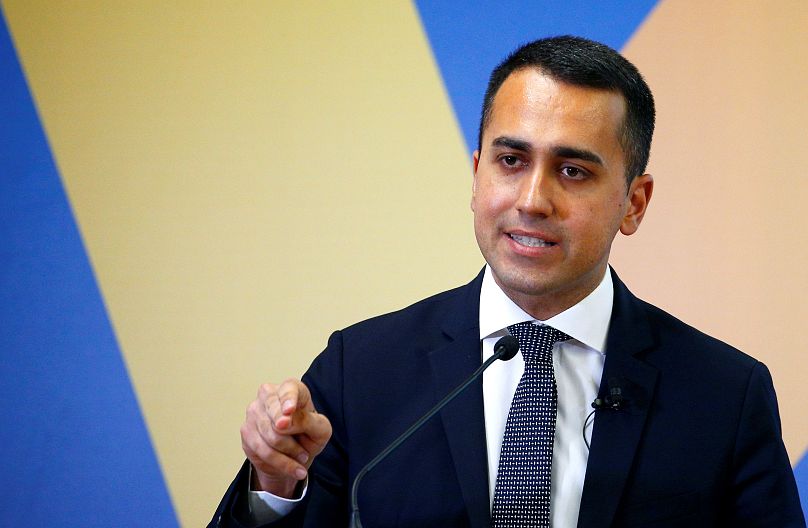The European Commission has recommended starting disciplinary procedures against Italy after it broke the EU’s debt rules last year and is likely to do so in 2019 and 2020.
The European Commission has recommended starting disciplinary procedures against Italy after it broke the EU’s debt rules last year and is likely to do so in 2019 and 2020.
The European Council will consider whether to start an “excessive deficit procedure” against Rome which could result in billions of euros in fines.
It follows comments by Italy’s deputy prime minister Matteo Salvini where he called the EU’s budget rules “obsolete,” as his government plans to introduce major tax cuts that will increase the deficit.
Italy had a public debt at 132% of GDP in 2018, which is well above the limit of 60% set by the EU.
Why does Italy’s debt burden matter so much?
During the Eurozone crisis in 2010 the European Central Bank was forced to bail out Portugal, Ireland, Greece, Cyprus and Spain after they were unable to make their debt repayments or could not afford to bail out their indebted banks.
If any of these countries were to default on their debts this would have crashed the Euro as a currency and likely forced the rest of the Eurozone into recession.
As part of the deal, the countries receiving loans had to agree to an austerity programme to reduce public debt.
However, Greece was forced to return for two further bailout packages in 2011 and 2013 and as a result faced severe austerity measures, which saw swingeing cuts to public spending.
Greece emerged from its final bailout package last year but is still repaying the total of €289 billion it borrowed from the International Monetary Fund and the ECB.
Despite Greece reporting a budget surplus and growth of around 1.5% in 2017, according to the World Bank, it still faces a debt burden of 180% and poses a risk to the overall financial health of the Eurozone.
Italy has the second-highest debt burden in the EU but as the third largest economy in the eurozone, it poses a significantly higher risk to the strength of the European economy as a whole if it were to default on its debts.
How did we get here?
Since 2018, Italy has been ruled by a coalition consisting of the populist Five Star Movement and the right-wing League party.
Both parties are Eurosceptic and have endorsed policies at odds with the fiscal conservatives in the EU.
The League’s landmark election policy consists of a “flat tax”, which would do away with tax bands and impose a single lower percentage rate.
Salvini has said the tax cuts will act as a “fiscal shock” to stimulate the Italian economy, which is the slowest growing in the EU according to European Commission figures.
Brussels has repeatedly written to Rome asking it to cut its budget deficit to 1.8% — rather than the 2.4% predicted by this tax cut — to make sure it is on track to reduce its public debt but the League has remained defiant.
In a Facebook post after the European election, Salvini called for the EU to ditch its budget rules as they “have been defeated by evidence, history and the popular vote”.
He said it was now important to “focus on jobs and growth” rather than debt rules.
The Commission formally wrote to the Italian government to explain why it had not met fiscal responsibilities last week.
Economy Minister Giovanni Tria responded blaming the worsening economy in the country and said Italy would return to observing EU budget rules from 2020.
Italy narrowly avoided disciplinary action over last year’s budget when the Commission refused to accept it, saying it would not cut the debt.
What happens next?
“To be clear, today we are not opening a procedure,” the EU commissioner for the Euro Valdis Dombrovskis said, adding that there were multiple steps to go before Italy saw any sanctions.
The first step is the EU’s Economic and Financial Committee, made up of national finance ministers and the heads of central banks in member states, will now have two weeks to decide whether to back the recommendation to proceed with disciplinary action.
If they do, the European Commission can then formally call for the opening of disciplinary action against Italy.
From July 8-9, finance ministers from the 28 EU member states will come to Brussels for their monthly meeting where they are expected to decide on the formal opening of disciplinary proceedings if the Commission has recommended it.
If the Commission starts disciplinary proceedings, Italy will be required to adopt immediate austerity measures such as high taxes and spending cuts to correct its deviation from the fiscal targets set by the EU within three to six months.
The Commission will have until July 29 to decide what level of sanctions they will impose on Italy.
If the Commission finds Italy is in “serious” breach of EU rules it can impose a non-interest bearing deposit worth 0.2% of GDP — around €3.5bn — which would be the biggest fine ever imposed by the institution.
If Italy still refuses to cooperate, it could face a fine of 0.5% of GDP and a cut to multi-billion euro loans from the European Investment Bank, as well as EU monitoring of Italy’s plans to issue more debt.
What are the consequences for Italy?
Although the League came top in the European elections in May and right-wing parties made major gains across Europe — particularly in countries like the UK where the Brexit party came top of the polls — the more moderate centre-right bloc is still the biggest in parliament.
Salvini’s fellow deputy prime minister, Luigi di Maio — who is the leader of the Five Star party — has accused the Commission of picking on Italy because France, Belgium and Cyprus have also been warned about their finances.
These countries are not under such significant pressure because the Commission believes their reforms were sufficient to reduce their debt burdens.
Di Maio said: “It's very annoying that every day a new way is found to speak badly about Italy and this government.”
If the EU were to follow through with imposing fines this is likely to push the Italian debt burden to breaking point, which would force the government to abandon its proposed tax cuts.
The only silver lining for Italy is that a new Commission will be appointed this Autumn to take up their roles in November.
Although Salvini’s grouping does not have the power to push through its preferred choice for Jean-Claude Juncker's replacement — one who may be more sympathetic to their cause — the weakening of the centre-right bloc may force the Commission to be more conciliatory going forward.













